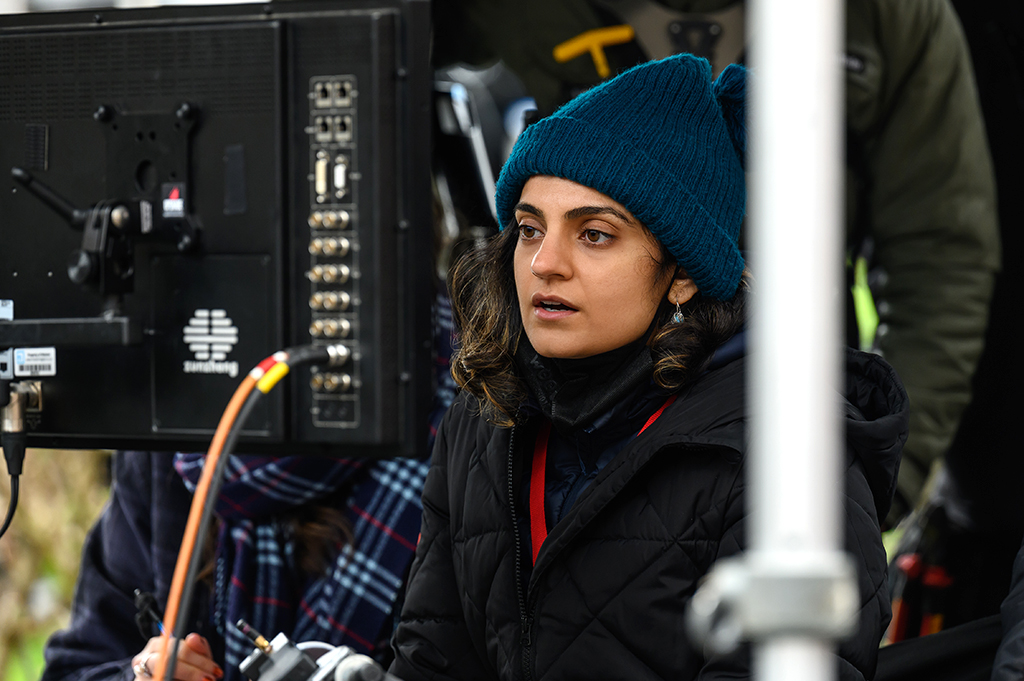By Kai Curry
NORTHWEST ASIAN WEEKLY
 I was pretty confident going into the movie, “Polite Society,” that I was going to like it. A review I had read was ringing in my head, which went to the effect of “I didn’t know I needed a South Asian martial arts movie—but I did.” Yay! I thought. This sounds fun! Gorgeous sequined saris + vicious right hooks and kicks to the face. What could go wrong?
I was pretty confident going into the movie, “Polite Society,” that I was going to like it. A review I had read was ringing in my head, which went to the effect of “I didn’t know I needed a South Asian martial arts movie—but I did.” Yay! I thought. This sounds fun! Gorgeous sequined saris + vicious right hooks and kicks to the face. What could go wrong?
The first sign should have been that there were zero South Asians in the theater. There were Asians, and in fact those were the majority, probably drawn in by the martial arts angle, the same way I conned my Chinese husband into going with me (It has fighting! And no subtitles!). I was surprised, though, by the low turnout to this movie (total of six) already being described as “the best comedy of the year” or even the “best movie of the year” and so I began to feel doubtful.
Coming out of the theater, I heard a movie-goer saying, “That was cool,” and I’m not suggesting this movie was a total fail, but it has issues (double entendre intended). I was excited, I was. A Pakistani English teenage girl kicking butt? Bring that on. But “Polite Society” lacked a consistent tone. Funny, creepy (you’ll get that later), edgy, retro? What is it? Well, hateful, for one. In desperate need of the team that worked on “Bullet Train” to give it a makeover. The timing was bad and it just had a lot going on, trying to tackle feminist issues, sister issues, South Asian cultural issues, mommy’s boy issues, the gamut, and ending up not fully succeeding.
“Polite Society” stars Priya Kansara as the anti-traditional girl, Ria, who wants to be a stuntwoman (you might recognize her from “Bridgerton”). Ria is very close to her big sister, Lena, played by Ritu Arya (who has a lengthy, respectable portfolio, including “Red Notice” and “The Umbrella Academy”). Lena wanted to be an artist, but has a complete personality change—symbolized by wearing cardigans, lol—when she gets matched with the neighborhood Pakistani “Golden Boy,” Salim (Akshay Khanna).

Ritu Arya stars as Lena and Akshay Khanna as Salim. (Credit: Parisa Taghizadeh / © 2023 FOCUS FEATURES LLC.)
Marriage between Ritu, who seems not at all his type, and Salim—indeed the most tall, dark, and handsome Pakistani bachelor you could imagine—is imminent, and Ria decides it is her mission to “save” her sister from death by ordinaryness. She desperately wants Lena to remember her anti-social artistic egotistical-in-a-good-way dreams and get away from what Ria is sure is a very bad match, not to mention just a contrivance of convention. So Ria sets out, with her two besties, Clara (played by Seraphina Beh, who was fantastic) and Alba (Ella Bruccoleri, whose scene with Beh at an elevator arguing over if she pushed the button is comedy gold) to find some dirt on Salim, or his family, and stop the wedding. That’s when everyone decides Ria’s definitely going through it—teenage hormones, sister love, or plain ole female hysteria.
By the way, why couldn’t they have released this movie like two weeks earlier? The main characters are Muslim and early in the movie, they attend an “Eid Soiree” (Eid being one of the biggest Muslim commemorative days) where Salim is eyeing up potential mates. It was cool to see this cultural and religious insertion, and I bet a lot more people would have come out to the movie if its release had aligned better with actual Eid, or Ramadan, both which are now over.
There were some creative plot twists, such as the fact that, for the majority of the movie, Ria cannot actually find anything wrong with her sister’s fiancé—that goes against what you expect, right? Surely her protective instinct is right, you think, but mostly it’s not. That IS funny, right? Like Ria, what a kook you’re being. BUT THEN! When Ria finally does find something quite wrong—in the realm of science fiction even—it’s quite hilarious that it is the one time she tries to reign herself in and be less dramatic. It’s Salim’s mother, played by Nimra Bucha, who can’t control her dreams for herself and her son, that lets the cat out of the bag.
The film is delivered in chapters, and each fight is heralded with a headline, i.e. “Khan vs. Khan,” when the two sisters get after it. You see, brainwashed Lena, who thinks she’s not good enough to be an artist and therefore might as well give in to matrimony, would like her needy little sister to stop trying to sabotage her engagement. They have a huge knock-down drag-out in the upstairs bedroom (with the parents calmly eating downstairs, which is funny); but tbh I was a bit shocked at how violent it was. Is it supposed to be funny that one sister pounds the other so badly she bleeds? That she rams her head into a framed photo of the two of them together and breaks the glass? Like, how mean is that? Is that something you get over easily later? Maybe I’m too soft, but for me, this did not rationally lead to the two sisters happy-dancing to the word “brunch” at the end of the movie—btw, weirdest, most dissatisfying movie ending ever.
Which brings me to one of my pet peeves. Why can these movie makers not END a movie? There were so many stellar opportunities. The two girls, all bedecked and bejeweled for Lena’s wedding, now in the getaway car, would have been perfect. Stella and Louise style. Instead, “Polite Society” goes on and on when it should have been over and I just don’t get it. Which also leads me to the feminist objective. Yes, these young girls are angry. Yes, they are tired of the patriarchy. They are tired of the old-fashioned expectations of their parents and neighbors—the titular “polite society,” I guess. They are tired of arranged marriages. They are tired of boys having all the fun and getting pampered to disgusting levels by their mothers. Women are angry, me too, and this is one of the self-avowed goals of the film’s writer and director, Nida Manzoor—she wanted to capture that. But when it warps into hate, I get worried this will compel the other side to even greater crimes against us. Maybe it’s me that needs to access my “fury” the way Ria does.

Director Nida Manzoor on the set of her film Polite Society. (Credit: Parisa Taghizadeh / © 2023 FOCUS FEATURES LLC.)
The sci-fi angle was not necessary, and yet was apparently deemed as the only way Ria could find a strong enough incentive for Lena to stop the marriage. The abandonment of her dreams and freedom from the totalitarian rule of her husband and her husband’s family was not enough, I guess. If “Polite Society” had stayed a melodramatic take on everyday Pakistani families in Great Britain, still tracking the issues of tradition and rebellion of the younger generation, especially girls, throwing in snappier timing, keeping beautiful emerald tone fabric flowing in the wind as Ria kicks somebody in the face, but without drawing blood—I would have enjoyed it more. But maybe that’s not the only desirable outcome. Maybe to fight others’ meanness, we too do also need to be meaner.
Kai can be reached at info@nwasianweekly.com.




